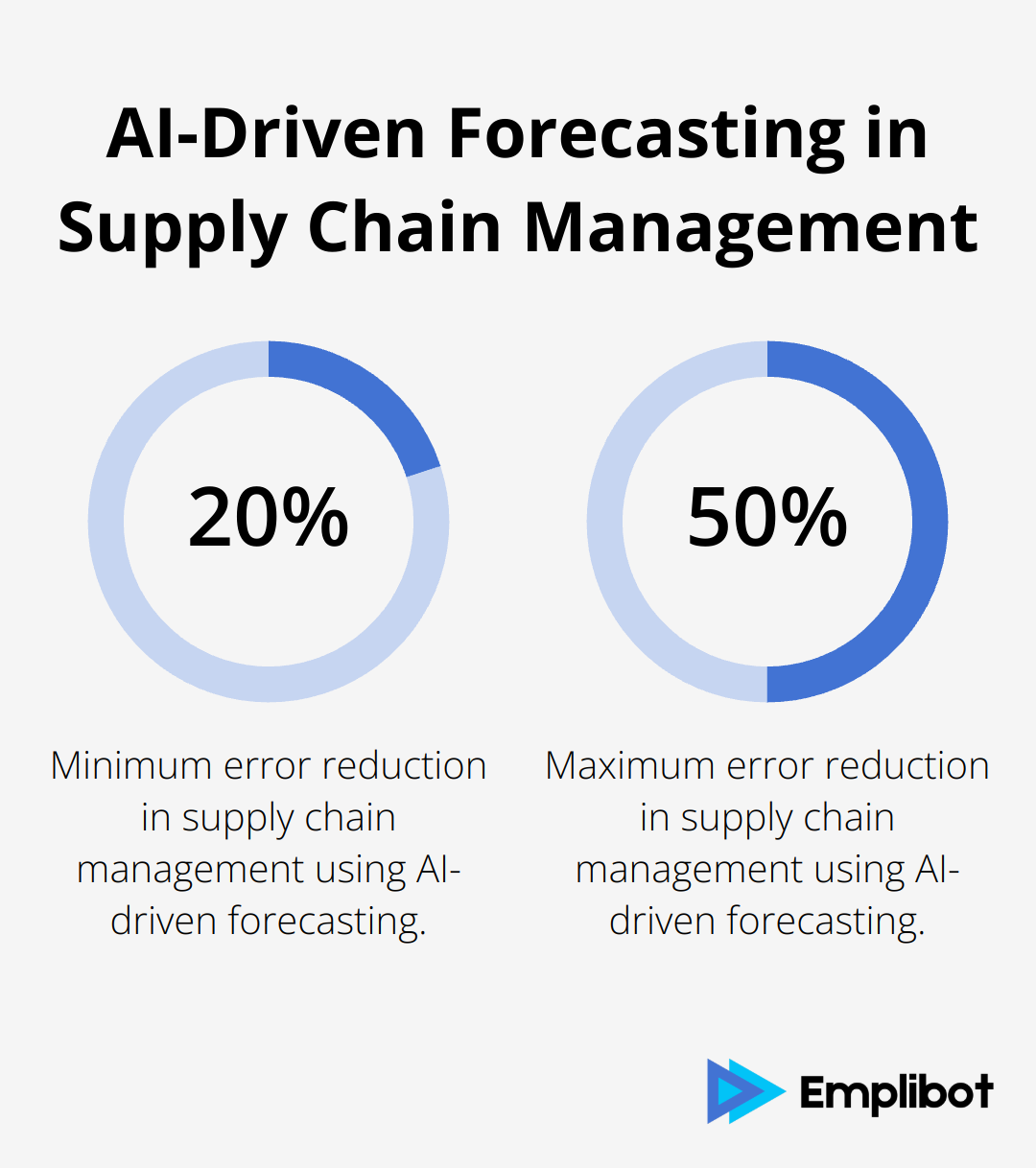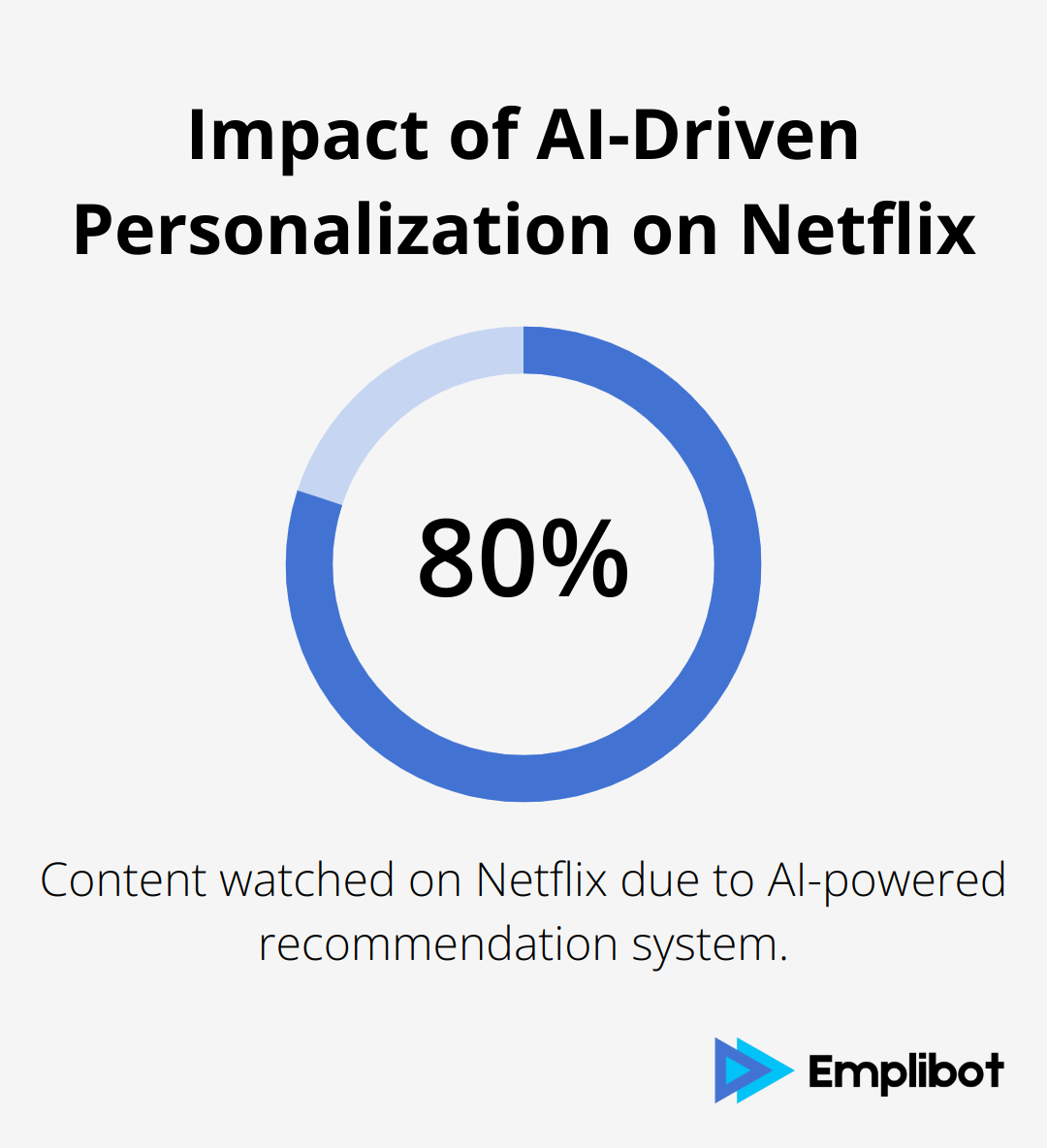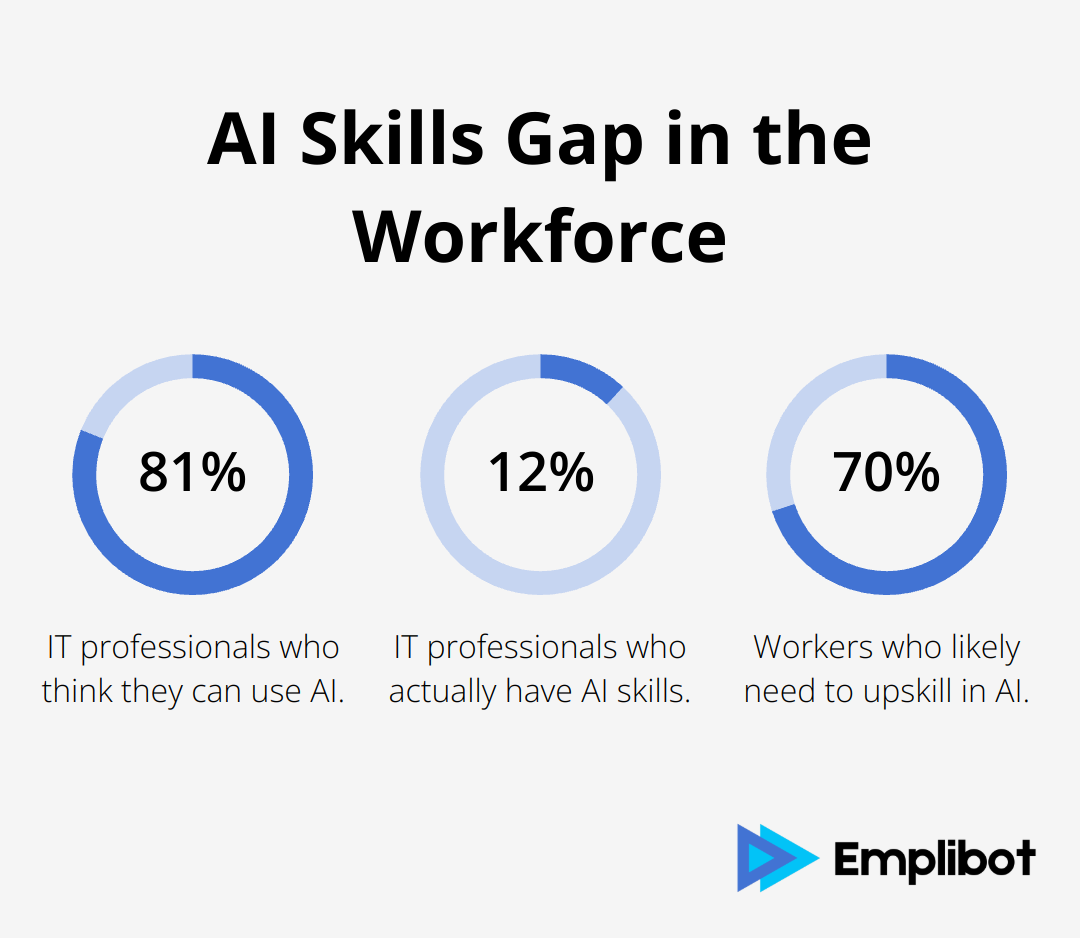AI and business intelligence are transforming how companies make decisions. At Emplibot, we’ve seen firsthand how these technologies are revolutionizing data analysis and strategic planning.
This blog post explores the impact of AI on business intelligence, from automating data processing to enhancing decision-making. We’ll also discuss the challenges and considerations businesses face when implementing AI-driven BI solutions.
Contents
ToggleHow AI Supercharges Data Analysis
AI revolutionizes data analysis in business intelligence, offering unprecedented speed and accuracy. This technology transforms how companies extract insights from their data.
Automation of Data Processing
AI reduces the time and effort required for data collection and processing. Machine learning algorithms automatically clean and standardize data from multiple sources, eliminating manual data entry and reducing errors. According to a recent Gartner report, organizations utilizing AI-driven productivity tools can boost efficiency by up to 40%, drastically reducing time spent on these tasks.
Uncovering Hidden Patterns
AI excels at identifying complex patterns and trends that humans might overlook. Advanced algorithms analyze vast amounts of data to uncover valuable insights. For example, a retail company using AI-powered analytics might discover that sales of certain products spike not just during obvious seasons but also during specific weather conditions or local events.
Prediction of Future Trends
The most powerful aspect of AI in business intelligence is its ability to forecast future trends. Predictive modeling uses historical data and machine learning algorithms to make accurate predictions about future events. Applying AI-driven forecasting to supply chain management, for example, can reduce errors by between 20 and 50 percent.

Real-World Applications
These AI capabilities aren’t just theoretical – they apply to real-world scenarios with impressive results. For instance, a major e-commerce platform reported a 30% increase in sales after implementing AI-driven product recommendations based on customer behavior analysis.
Advanced Tools and Platforms
While tools like Tableau and Power BI offer some AI features, more comprehensive solutions exist. Emplibot, for example, automates the entire content creation and distribution process, allowing businesses to leverage AI-powered insights in their marketing strategies effortlessly.
As AI continues to evolve, we can expect even more sophisticated analysis capabilities. The next chapter will explore how these AI-driven insights translate into enhanced decision-making processes for businesses, fundamentally changing how companies strategize and operate in the data-driven economy.
How AI Transforms Business Decision-Making
AI-powered business intelligence revolutionizes how companies make strategic decisions. This technology enables organizations to leverage data in unprecedented ways, leading to more informed and effective decision-making processes.
Data-Driven Strategy Development
AI algorithms analyze vast amounts of data to identify trends and patterns that inform strategic planning. A retail chain used AI to analyze customer purchase data, foot traffic patterns, and local demographics. This analysis led to a 15% increase in sales after the company optimized store layouts and product placement.
Companies now make decisions based on real-time data rather than relying on outdated reports. A manufacturing firm implemented AI-driven analytics to monitor production line efficiency, which resulted in a 20% reduction in downtime and a 10% increase in overall productivity.
Proactive Risk Management
AI significantly enhances risk assessment and management capabilities. Financial institutions use machine learning algorithms to detect fraudulent transactions in real-time, reducing losses by up to 60% (according to a study by Deloitte).
In supply chain management, AI predicts potential disruptions before they occur. A global logistics company implemented an AI-powered risk assessment tool, which reduced shipping delays by 35% and saved millions in potential losses.
Hyper-Personalized Customer Experiences
AI enables businesses to deliver highly personalized customer experiences at scale. Netflix’s recommendation system (powered by machine learning) is responsible for 80% of the content watched on the platform, demonstrating the power of AI-driven personalization.

E-commerce giants like Amazon use AI to analyze customer behavior and provide tailored product recommendations. This level of personalization has led to a 29% increase in sales for businesses implementing AI-driven recommendation engines (as reported by McKinsey).
Real-Time Decision Support
AI-powered systems provide real-time insights and recommendations, allowing managers to make quick, informed decisions. For example, a large retailer uses AI to adjust pricing and inventory levels in real-time based on demand fluctuations, weather patterns, and competitor actions.
These AI-driven decision-making capabilities extend beyond traditional business intelligence tools. While platforms like Tableau and Power BI offer some AI features, more comprehensive solutions exist. Emplibot, for instance, stands out as a top choice for businesses looking to leverage AI in their content marketing strategies.
As we explore the transformative power of AI in business decision-making, it’s important to acknowledge that this technology also brings its own set of challenges and considerations. The next chapter will examine these potential hurdles and discuss how businesses can navigate them effectively.
Navigating AI Challenges in Business Intelligence
Data Quality and Integration Issues
AI in business intelligence relies heavily on high-quality, well-integrated data. Poor data quality leads to inaccurate insights and flawed decision-making. Organizations lose an average of $12.9 million annually due to poor data quality (according to a Gartner study).
Companies should:
- Implement robust data governance policies
- Use data cleansing tools to standardize and validate data
- Regularly audit data sources for accuracy and relevance
A major retailer improved its data quality by implementing automated data validation checks. This action reduced errors by 40% and saved $5 million annually in avoided decision-making mistakes.
Ethical Concerns and Bias in AI Algorithms
AI algorithms can perpetuate and amplify existing biases, resulting in unfair or discriminatory outcomes. Addressing bias in AI requires business leaders to see, direct and navigate strategies. The ultimate goal is to mitigate bias in AI to unlock value responsibly.
To mitigate these risks, companies should:
- Diversify AI development teams
- Regularly audit AI models for bias
- Implement transparent AI decision-making processes
Morgan Stanley developed an AI-driven wealth management tool that underwent rigorous bias testing. This resulted in a 30% increase in client trust and a 25% boost in adoption rates.
Skill Gap and Training Requirements
The shortage of AI talent presents a significant barrier to implementation. A 2024 survey indicates that 81% of IT professionals think that they can use AI, but only 12% actually have the skills to do so. And 70% of workers likely need to upskill in AI.

To address this skills gap, businesses should:
- Invest in employee training and upskilling programs
- Partner with universities to develop AI talent pipelines
- Consider AI-as-a-Service solutions for quicker implementation
Accenture reported that companies investing in AI skills training saw a 53% faster time to value on AI projects.
Choosing the Right AI Solution
While tools like Tableau and Power BI offer some AI capabilities, more comprehensive solutions exist. Emplibot stands out as a top choice for businesses looking to leverage AI in their content marketing strategies without extensive in-house expertise.
Data Privacy and Security Concerns
As AI systems process vast amounts of data, ensuring privacy and security becomes paramount. Companies must comply with regulations like GDPR and CCPA while protecting sensitive information from breaches.
Businesses should:
- Implement robust encryption methods
- Regularly update security protocols
- Conduct thorough risk assessments
A healthcare provider implemented advanced encryption and access controls for its AI-driven patient data analysis system. This action resulted in a 70% reduction in data breach attempts and improved patient trust by 45%.
Final Thoughts
AI and business intelligence transform the corporate landscape, offering unprecedented opportunities for data-driven decision-making. Companies that leverage AI-powered BI tools see significant increases in sales, reductions in operational costs, and enhanced customer experiences. These technologies fundamentally change how businesses operate and compete in the digital age.
The future of AI in business intelligence promises even more sophisticated algorithms, capable of processing increasingly complex datasets. Real-time analytics at unprecedented scales will further accelerate decision-making processes. Companies should assess their current data infrastructure and identify areas where AI can add the most value.
Businesses can quickly harness the power of AI through platforms like Emplibot. Emplibot automates content creation and distribution, allowing companies to leverage AI-powered insights in their marketing strategies. Organizations that successfully integrate AI and business intelligence will unlock new levels of efficiency, innovation, and competitive advantage.










